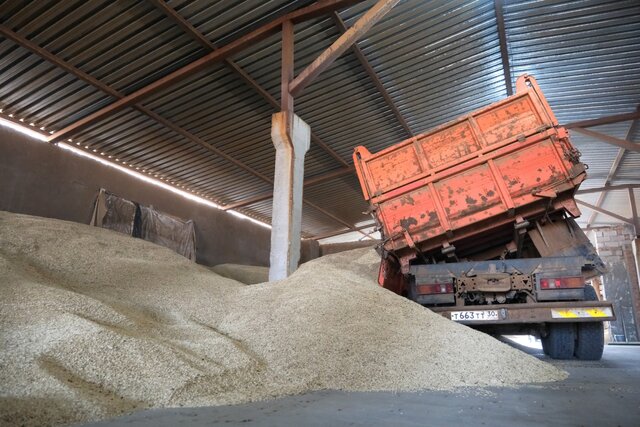The Kremlin’s grain spin. Russia’s ‘compact harvest’ is the latest entry in its expanding euphemism playbook
Manage episode 497724634 series 3381925

There’s a new addition to Russia’s expanding dictionary of euphemisms — officials have started to describe the country’s below-average grain yield as a “compact harvest.” Instead of reassuring the public, the phrase has only fueled suspicion and criticism. And it might all be beside the point: despite a second year of weak yields in the south, Russia’s 2025 harvest isn’t shaping up to be a disaster.
On July 15, Dmitry Rylko, the general director of Russia’s Institute for Agricultural Market Studies (IKAR), introduced a new euphemism in an interview with the agricultural magazine Pole.rf: “compact harvest.” The term is the latest addition to a growing lexicon of state doublespeak aimed at recasting harsh realities in vague and gentler terms. Since the start of the full-scale war, pro-government media and officials have increasingly used phrases like “negative growth” instead of “decline,” or “a loud bang” in place of “explosion.”
The very fact that a euphemism was needed to describe the country’s grain yield struck many as an ominous sign. “What exactly is a compact grain harvest supposed to mean?” one commenter asked under a post using the term. “Like, ‘there’ll be nothing to eat, but keep your mouth shut’? And let’s not even talk about quality.” “Cool,” another user wrote. “Guess I’ll go buy a compact fridge to match.”
A few days after the phrase first appeared, a farmer from the Rostov region took aim at it in an interview with Novye Izvestia, calling it a predictable move by a government that poorly manages the agricultural sector — and then scrambles to reframe the consequences with language designed to make reality sound less bleak.
Potato problems
Still, on the national scale, there’s no disaster.
IKAR itself is projecting a 2025 grain harvest of around 130 million metric tons — roughly the same as, or even slightly more than, in 2024 (which came in at 126 million tons, according to Rosstat). That’s noticeably down from Russia’s typical yields — the 2023 harvest totaled 145 million tons — but still more than enough to cover the next planting season, meet domestic demand, and support exports.
Unlike oil, gas, and metals, Russian grain exports remain unsanctioned and continue to bring in valuable foreign revenue.
The drop in yields came mostly from Russia’s main agricultural regions in the south — places like Krasnodar Krai and the Rostov region — which were hit by a prolonged drought. Grain productivity there fell by about a quarter compared to 2024. Analysts expect other regions with stronger harvests to make up the shortfall.
We usually do the talking at fundraisers. This time, we’ll let our readers speak for us. “I’m just a regular guy who recently graduated from college and used to send Meduza a hundred rubles every month. Putin stole my country from me, took away my ability to speak out, and even my freedom to spend my own hundred rubles. Please help Meduza! Freedom for Russia!” — Anonymous
64 episodes




